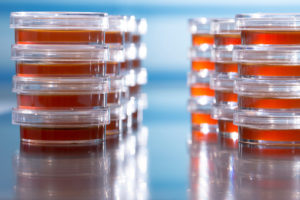Cost-effective, large-scale production of red blood cells (RBCs) would eliminate blood shortages and ensure antigen-compatible cells are available for alloimunized patients. RBCs have been cultured from cord blood cells, but the yield is low and cells produce fetal hemoglobin prone to denaturation. As described in Blood Advances, researchers in the Netherlands have optimized large-scale cultures of RBCs from peripheral blood mononuclear cells (PBMCs) without CD34+ isolation using a good manufacturing practice (GMP)-grade culture medium. The cultures yield a 107-fold increase in erythroblasts in 25 days and can be differentiated to RBCs in 12 days with >90% enucleation. Furthermore, the cultured RBCs synthesize adult hemoglobin and the correct blood group antigens, and the cells express a consistent transcriptome. Further optimization, cost reduction strategies, and safety studies of cultured RBCs are still necessary.
Show Comments
Comments on this article are closed.

